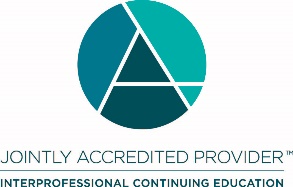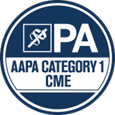Effi Barry Training Institute’s Virtual Provider Summit
Target Audience
This activity is intended for physicians, physician assistants, advanced practice registered nurses, registered nurses, social workers and other healthcare providers engaged in the care of patients with HIV.
Faculty
Michael Shankle
Senior Director of Capacity Building
Frank Hawkins, MS, ICGC-1, Director of Advocacy and Community Engagement, AIDS Delaware
Julia Hidalgo, ScD, MSW, MPHChief Executive Officer, Positive Outcomes, Inc.
Hanna Tessema, MPH, MSWTraining Consultant
Monica Ruiz, PhD, MPHAssociate Professor, George Washington University
Emmanuel Oppong-Adjei, MPHTrainer Educator III, Delaware Division of Public Health
Tamara Henry, EdDAssistant Teaching Professor, George Washington University
Natella Rakhmanina, MD, PhD, FAAP, FCP, AAHIVSProfessor with Tenure, George Washington University
Educational Objectives:
Session: Systems Coordination & Development
Identify the correlation and significance of HIV Continuum of Care and System Coordination
Define the gaps in service for PLWHA
Discuss the importance of communication between the various “systems”
Examine key standards of operation (SOPs) between various service providers
Session: Conducting a Gap Analysis
Discuss the framework for conducting a gap analysis in conducting Ending the HIV Epidemic (EHE): A Plan for America activities in designing, implementing, evaluating, and improving HIV prevention and care services.
Examine HIV cascades to identify and interpret gaps in HIV Care Continuum.
Identify timely, accurate data sources to improve the accuracy of prevention and care cascades and gap analyses.
Apply prevention and care cascade data to design regional, local, agency-specific and population-specific cascades and gathering data to compute them.
Session: Building Organizational Capacity & Developing Leadership
Define organizational capacity
Practice assessing capacity
Discuss the building blocks of organizational readiness and partnership building
Compare the difference between leadership and management
Session: HIV Program Implementation & Improvement
Specify the specific Behavioral Objectives and Health Objectives associated with their programs
Identify the data that are needed to determine if their programs are successful in achieving the Behavioral and Health Objectives
Identify the data necessary to measure successful program implementation
Identify the areas in which program implementation can be improved
Identify the data necessary to determine successful program improvement
Session: Data Collection & Sharing
Brainstorm types of data most important to HIV/AIDS programs
Identify common data needs that would affect optimal client care
Discuss barriers to data collection and sharing
Explore protocols for your program to support data collection and sharing
Session: Leveraging Program Income to End the Epidemic
Identify what program income is and how it is generated under by Ryan White HIV/AIDS Program (RWHAP) awards
Discuss when and how to spend program income
Discuss tracking and reporting program income earned and expended
Identify HIV/AIDS Bureau (HAB) requirements and resources regarding Policy Clarification Notice (PCN) 15-03 and related frequently asked questions (FAQs)
Determine with Federal requirements related to program income
Identify at least three methods for generating, accounting for, and reporting program income
Session: Population Engagement & Targeted Testing
Identify effective strategies to engage focus populations
Discuss the process for engaging focus populations
Review evidence based strategies that have been successful in focus populations
Session: Advancing HIV Prevention, Care, and Treatment
Describe recent dynamics in the epidemiology of HIV infection regionally and nationally
Identify the principles of modern approaches to the HIV prevention
Identify the data sources necessary to determine whether or not structural factors affect program utilization by clients
Summarize current approaches to the HIV care and treatment
Apply the latest updates in the US HHS HIV prevention and treatment guidelines
Session: Care Coordination to Reach Viral Suppression
Identify sustained viral suppression as an ultimate goal of HIV management
Review current state of the HIV care continuum and viral suppression in the USA and Washington, DC metropolitan area
Identify factors associated with the failure to achieve viral suppression
Apply principles of care coordination to reach and sustain viral suppression into practice
Session: Treatment & Wellness Support to Reduce New Infections
Describe PrEP & TasP
Discuss the DC plan to end the epidemic
Explore HIV wellness and prevention measures
Become familiar with best practices for reducing new HIV infections
Joint Accreditation Statement
In support of improving patient care, this activity has been planned and implemented by the Postgraduate Institute for Medicine and HealthHIV. Postgraduate Institute for Medicine is jointly accredited by the Accreditation Council for Continuing Medical Education (ACCME), the Accreditation Council for Pharmacy Education (ACPE), and the American Nurses Credentialing Center (ANCC), to provide continuing education for the healthcare team.
Physician Continuing Medical Education
The Postgraduate Institute for Medicine designates this live activity for a maximum of 10.5 AMA PRA Category 1 Credits™. Physicians should claim only the credit commensurate with the extent of their participation in the activity.
Continuing Physician Assistant Education
Postgraduate Institute for Medicine has been authorized by the American Academy of PAs (AAPA) to award AAPA Category 1 CME credit for activities planned in accordance with AAPA CME Criteria. This activity is designated for 10.5 AAPA Category 1 CME credits. PAs should only claim credit commensurate with the extent of their participation.
Continuing Nursing Education
The maximum number of hours awarded for this Continuing Nursing Education activity is 10.5 contact hours.
Continuing Social Worker Education
As a Jointly Accredited Organization, Postgraduate Institute for Medicine is approved to offer social work continuing education by the Association of Social Work Boards (ASWB) Approved Continuing Education (ACE) program. Organizations, not individual courses, are approved under this program. State and provincial regulatory boards have the final authority to determine whether an individual course may be accepted for continuing education credit. Postgraduate Institute for Medicine maintains responsibility for this course. Social workers completing this course receive 10.5 clinical continuing education credits.
CHES
Sponsored by Postgraduate Institute for Medicine, a designated provider of continuing education contact hours (CECH) in health education by the National Commission for Health Education Credentialing, Inc. This program is designated for Certified Health Education Specialists (CHES) and/or Master Certified Health Education Specialists (MCHES) to receive up to 10.5 total Category I contact education contact hours. Maximum advanced-level continuing education contact hours available are 10.5. Provider ID# 101879. Full attendance required to receive credit.
Disclosure of Conflicts of Interest
Postgraduate Institute for Medicine (PIM) requires instructors, planners, managers, and other individuals who are in a position to control the content of this activity to disclose any real or apparent conflict of interest (COI) they may have as related to the content of this activity. All identified COI are thoroughly vetted and resolved according to PIM policy. PIM is committed to providing its learners with high quality activities and related materials that promote improvements or quality in healthcare and not a specific proprietary business interest of a commercial interest.
Faculty
The faculty presenters have no conflicts of interest to disclose.
Planners and Managers
The PIM planners and managers have nothing to disclose. The HealthHIV planners and managers have nothing to disclose.
Disclosure of Unlabeled Use
This educational activity may contain discussion of published and/or investigational uses of agents that are not indicated by the FDA. The planners of this activity do not recommend the use of any agent outside of the labeled indications. The opinions expressed in the educational activity are those of the faculty and do not necessarily represent the views of the planners. Please refer to the official prescribing information for each product for discussion of approved indications, contraindications, and warnings.
Disclaimer
Participants have an implied responsibility to use the newly acquired information to enhance patient outcomes and their own professional development. The information presented in this activity is not meant to serve as a guideline for patient management. Any procedures, medications, or other courses of diagnosis or treatment discussed or suggested in this activity should not be used by clinicians without evaluation of their patient’s conditions and possible contraindications and/or dangers in use, review of any applicable manufacturer’s product information, and comparison with recommendations of other authorities.
Request for Credit
If you wish to receive acknowledgment for completing this activity, please complete the evaluation on www.cmeuniversity.com. On the navigation menu, click on “Find Post-test/Evaluation by Course” and search by course ID 15731. Upon registering and completing the activity evaluation, your certificate will be made available immediately.


